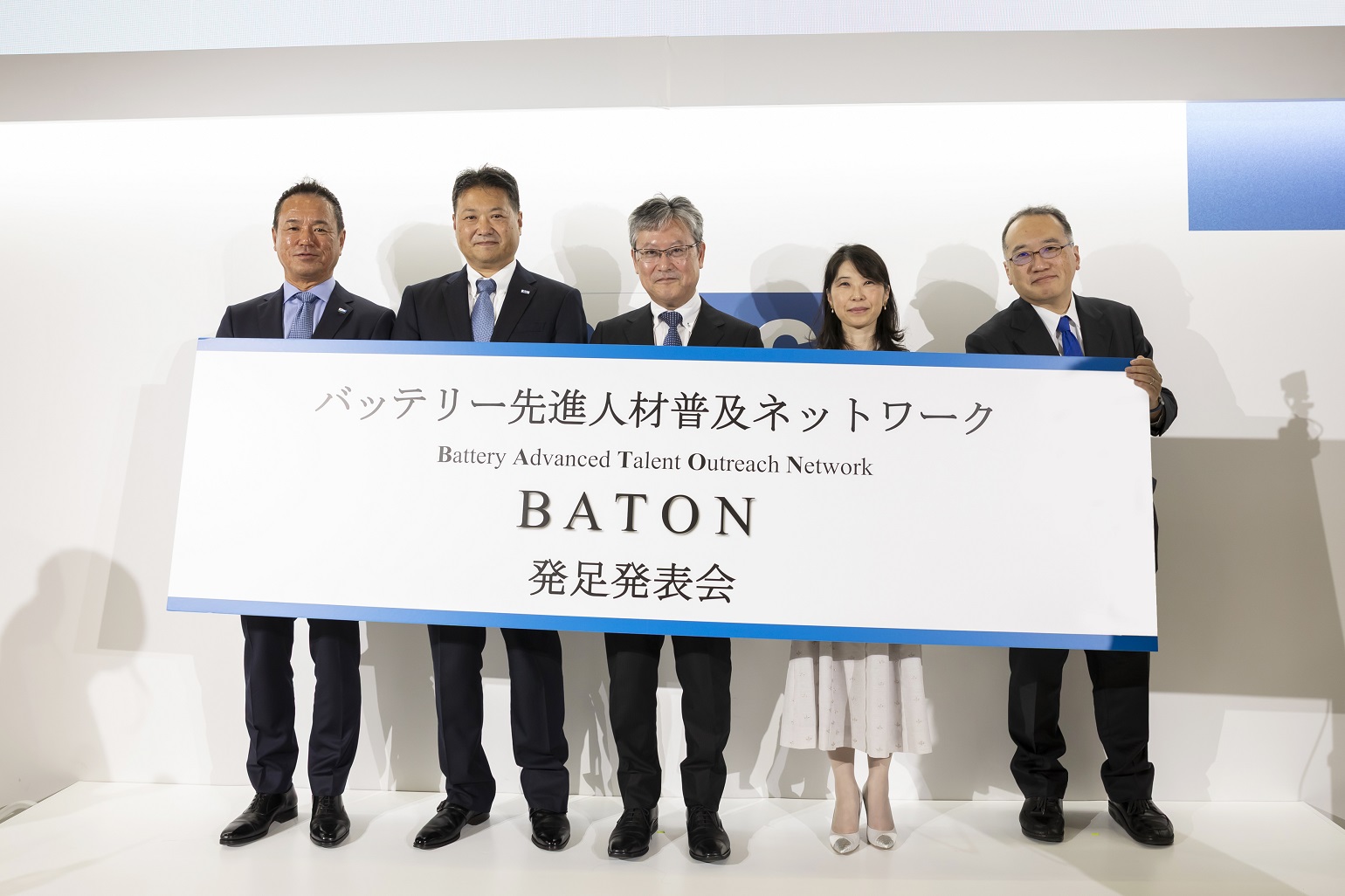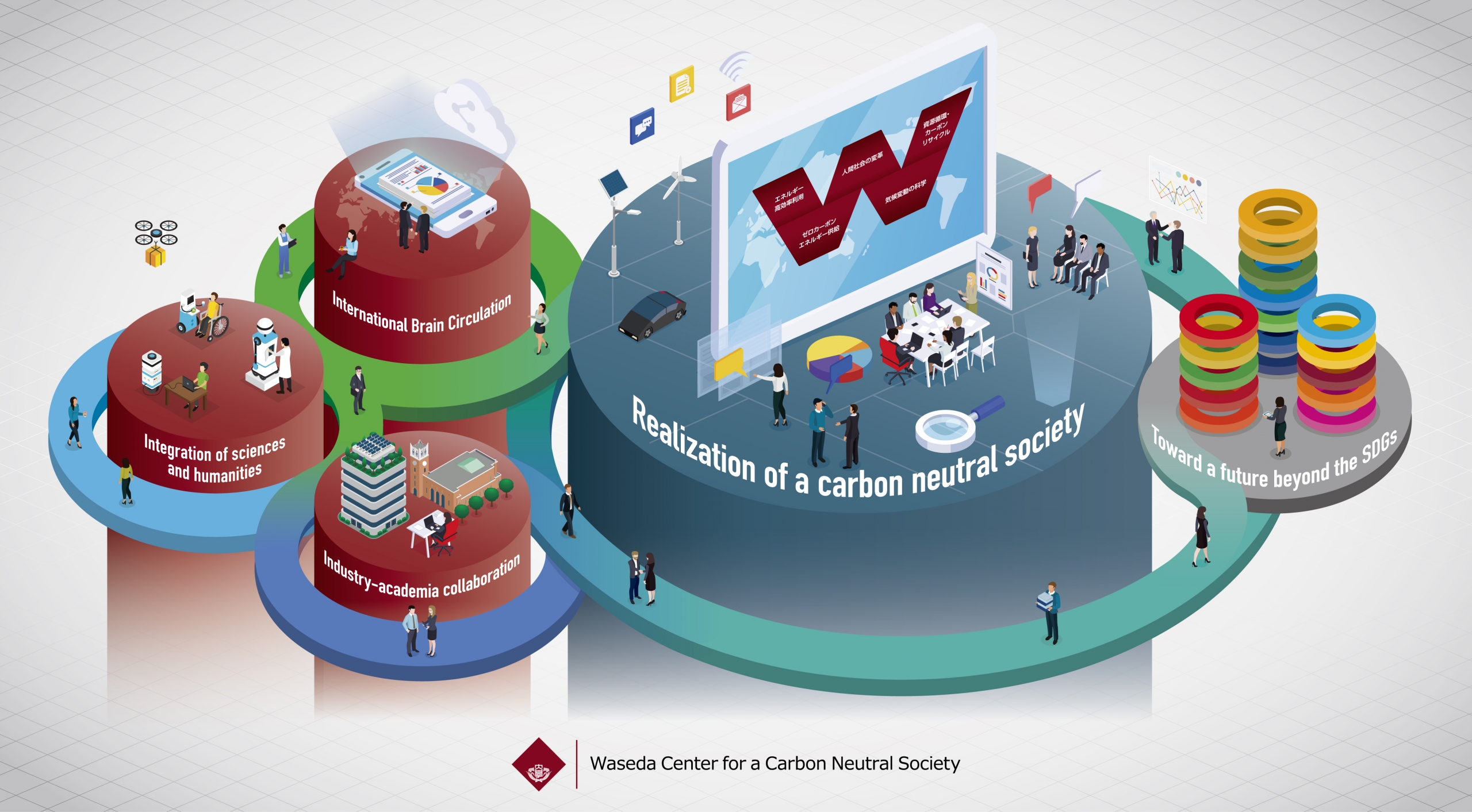- Featured Article
Waseda University Promotes the Development of Battery Specialists
Fri 17 Oct 25
Fri 17 Oct 25
“Battery Advanced Talent Outreach Network (BATON)” Launched
On Tuesday, October 14, 2025, an event to announce the launch of the Battery Advanced Talent Outreach Network (BATON), which Waseda University joins as a participant, was held. BATON is a new framework for industry-academia-government collaboration aimed at developing people of high aptitude for the storage battery industry. The University is collaborating with the Battery Association for Supply Chain (BASC), a general incorporated association, to offer a collaborative course called “Introduction to Battery Engineering” in 2025. BATON plans to use this course as a precedent and aims to expand the program to other universities.
This article reports on part of the BATON launch announcement event.
*The remarks of each speaker are excerpts or summaries.
Increasing demand in the battery storage industry and the importance of developing next-generation talent
The Battery Advancement Talent Organization Network (BATON) is a framework for collaboration between industry, government, and academia to widely disseminate and raise awareness of the development of the next generation of advanced talent who will support the realization of a decarbonized and digital society, and to contribute to the development of Japan’s battery industry.
At the beginning of the launch announcement, Hiroaki Koda, Chairman of BASC, explained the background to the launch of BATON.
“The Battery Industry Strategy formulated by the Japanese government in August 2022 set a public-private goal of building a 150GWh battery manufacturing base domestically by 2030. To achieve this, it is estimated that approximately 30,000 battery personnel will be needed. In the Kansai region, where the battery industry is concentrated, we have taken the lead in establishing the Kansai Battery Personnel Development Consortium, which has created an educational program through industry-academia collaboration. We have incorporated various ideas to stimulate students’ interest in the battery industry, and as a result, the number of schools offering battery education has expanded to 30, mainly high schools and technical colleges in the Kansai region. A total of approximately 1,600 people have taken the course over the past two years. We have received strong demand from regions outside of Kansai to spread the program, which is why we have decided to launch BATON,” says Koda.
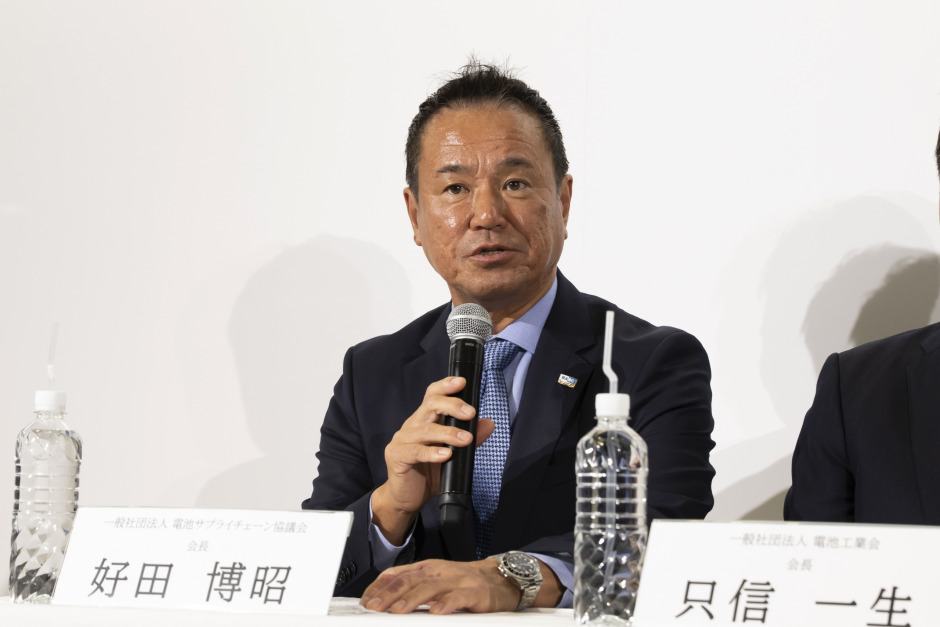
Hiroaki Koda, Chairman of the Battery Association for Supply Chain
Batteries, which are experiencing increasing demand worldwide, are a broad-based industry that encompasses resources, materials, equipment, batteries, reuse, and recycling. Koda emphasizes the importance of talent development, saying, “This is a field in which a wide range of talent can thrive, regardless of whether they have a background in science or humanities.”
“By involving professionals from various fields, BATON hopes to create even more comprehensive teaching materials and educational programs. BASC and the Battery Association of Japan (BAJ) will act as the BATON secretariat, and the main companies actively participating in the initiative will be Japan’s major battery manufacturers: GS Yuasa, Toyota Battery, Panasonic Energy, and Prime Planet Energy & Solutions (PPES). Furthermore, the National Institute of Technology has cooperated with us in the creation of teaching materials and the dissemination of educational programs through the Kansai Battery Human Resources Development Consortium. We also plan to invite professors from universities that are leading battery research in Japan to participate in the initiative,” says Koda.
Waseda University is one of the universities participating in BATON. In 2025, the University introduced a collaborative course with BASC called “Introduction to Battery Engineering: Considering the Future of Japan’s Battery Industry.” From April to July, a total of 14 lectures were held, featuring various stakeholders from industry and government.
“The collaborative course with Waseda University provided a wide-ranging program, covering the current and future evolution of manufacturing with a bird’s-eye view of the entire battery supply chain, as well as explaining the business structure from a global perspective. We hope to use this precedent as a model case and expand it to other universities in the future,” said Koda.
Later in the presentation, three speakers, including Kazuo Tadanobu, Chairman of the Battery Association of Japan, which serves as the BATON secretariat; Yukito Kobayashi, Counselor in Charge of Academic Affairs at the National Institute of Technology, an independent administrative institution that supports BATON; and Satoshi Nohara, Director-General of the Commerce and Information Policy Bureau at the Ministry of Economy, Trade and Industry, gave comments and shared their expectations and outlook for the project.
Waseda University's interdisciplinary education contributes to BATON
From Waseda University, Professor Chiharu Tokoro, Dean of the School of Creative Science and Engineering and the Graduate School of Creative Science and Engineering, took the stage and reported on the development of talent for storage batteries at Waseda University. She explained that since the declaration of the “Waseda Carbon Net Zero Challenge” in 2021, the University has been working to realize a carbon-neutral society, including cutting-edge research and human resource development.
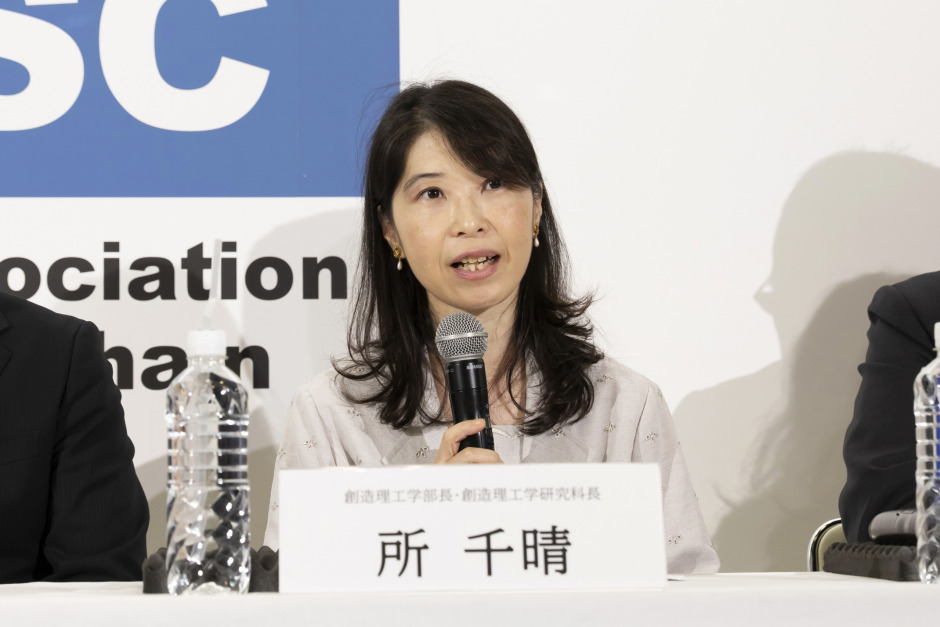
Waseda University School of Creative Science and Engineering Dean, Graduate School of Creative Science and Engineering Professor Chiharu Tokoro
“Since its founding, Waseda University has been responsible for higher education, with the mission of educating people who will be useful to society and promoting research that will be useful to society. To realize ‘Waseda’s Research,’ ‘Waseda’s Education,’ and ‘Waseda’s Contribution,’ we are currently focusing on reforms that cut across various faculties. In particular, in the area of ‘Waseda’s Education,’ we have established the ‘Carbon Neutral Society Research and Education Center’ and created a ‘Carbon Neutral Minor’ across academic faculties, bringing together researchers and students. Cultivating battery talent, which plays an important role in carbon neutrality, is in line with our university’s direction, so we have established the ‘Introduction to Battery Engineering – Considering the Future of Japan’s Battery Industry.'”
Professor Tokoro, who also taught the “Introduction to Battery Engineering” course, looks back on the achievements of 2025.
“A variety of students participated in this program, which allows students to earn credits across departments. A variety of classes were held, including lectures by leaders in each field, discussions with senior employees, and group work. Particularly impressive was the factory tour, where students’ eyes lit up at the manufacturing site. Survey results also showed favorable responses in many areas, and we believe that this is a good start for Waseda University.” (Professor Tokoro)
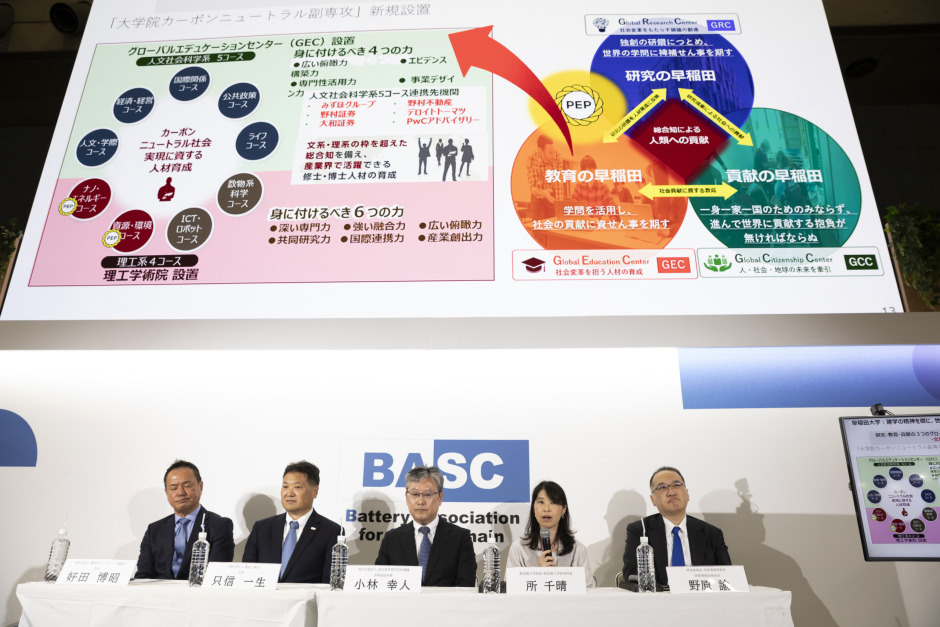
Waseda University will introduce the "Carbon Neutral Leader" program as an undergraduate minor from 2022, and a graduate minor that contributes to the realization of a carbon-neutral society from 2024 and will develop collaborative courses with companies.
Various companies and educational institutions are expected to participate in BATON in the future. It is hoped that Waseda University’s pioneering example will be expanded nationwide, revitalizing the battery industry through talent development.
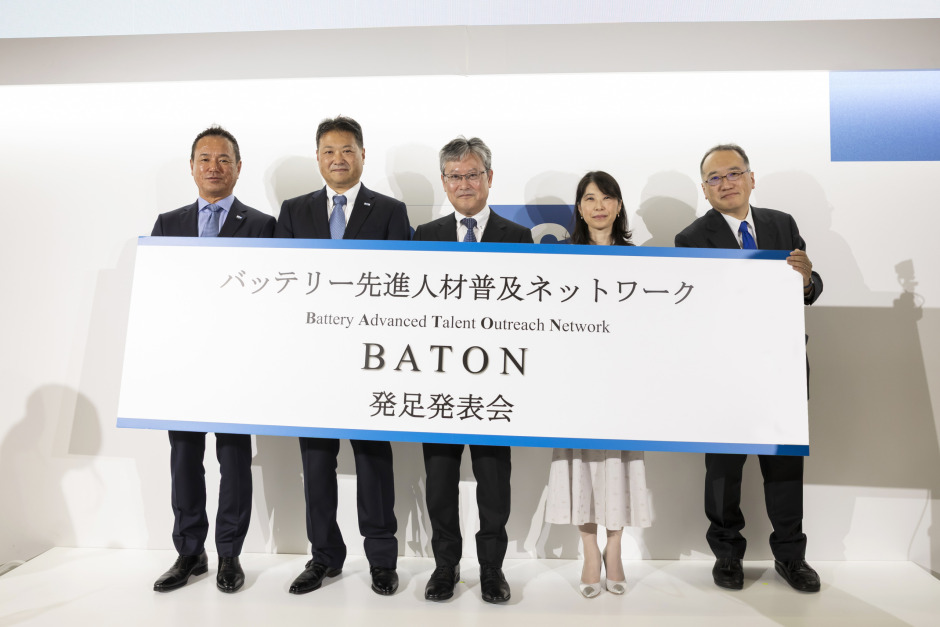
From left: Mr. Koda, Mr. Tadanobu, Mr. Kobayashi, Professor Tokoro, and Mr. Nohara
Photo taken at Makuhari Messe

